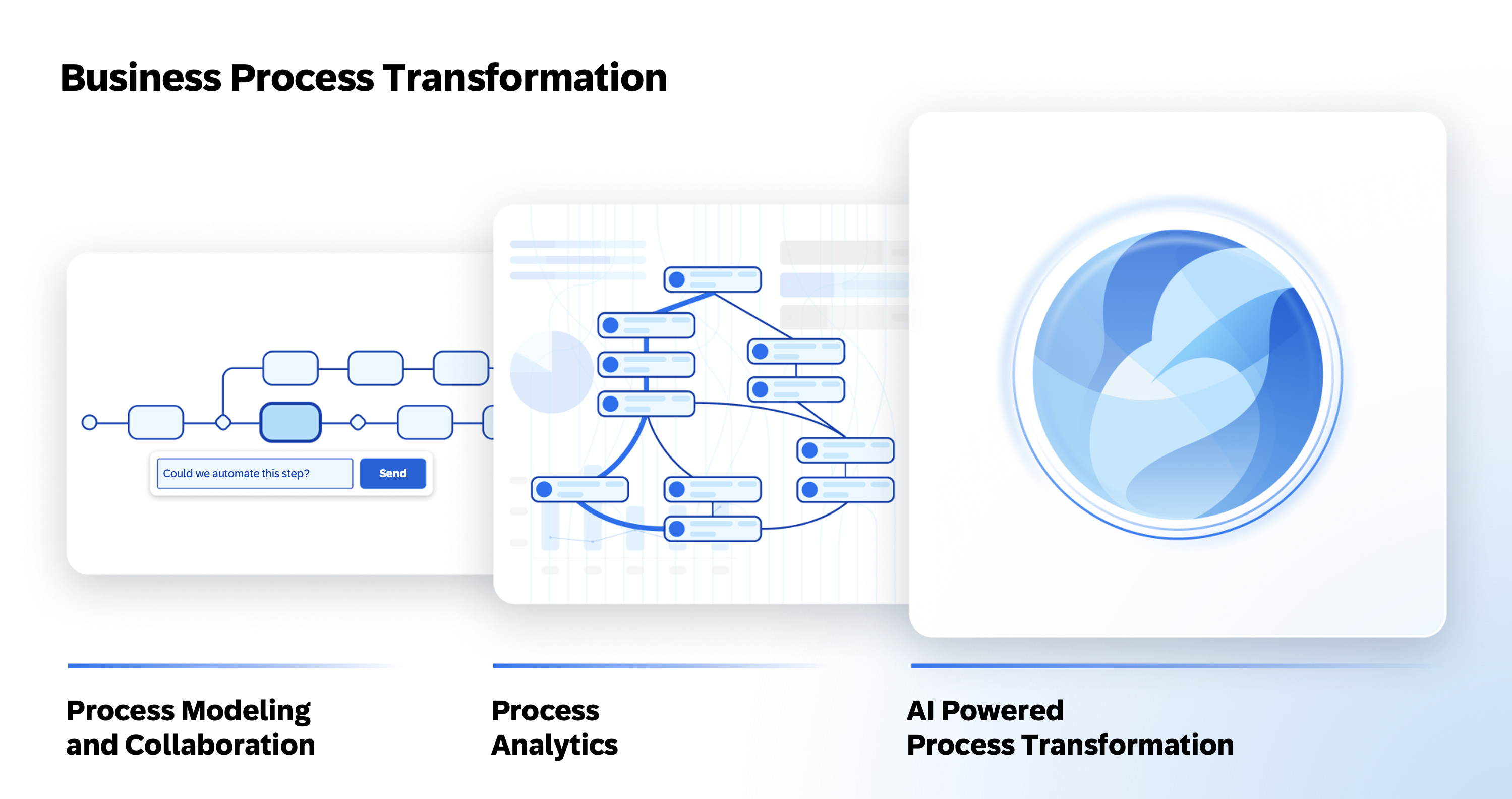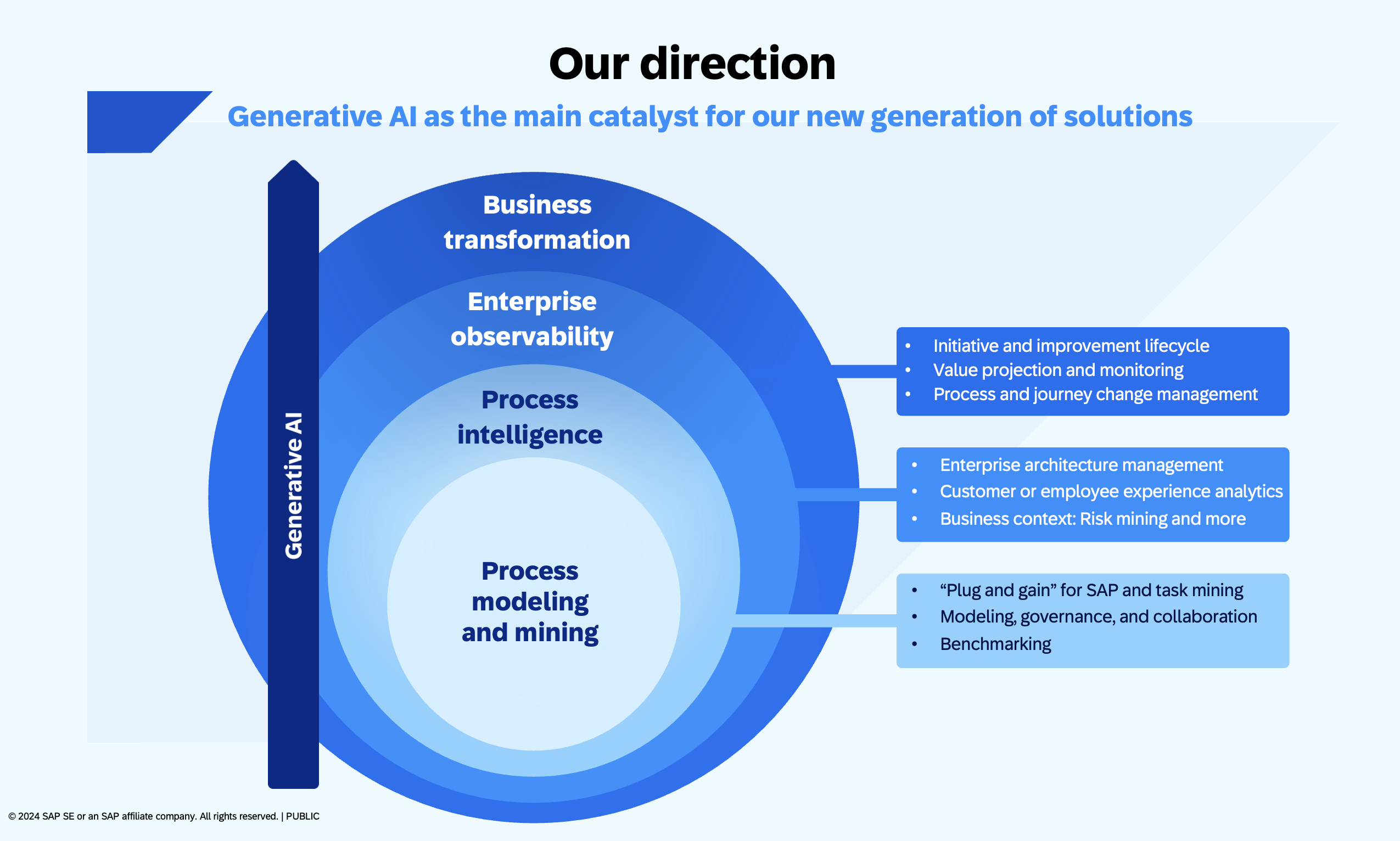Generative Artificial Intelligence (Gen AI) is making waves as one of the most disruptive technologies of our time. In this series, we’re exploring how it can fuel business transformation. If you haven’t already, take a look at our previous blog post in which we broke down the evolution of business process management into three distinct generations.
In this post, we’ll dive into the specific ways Gen AI is poised to reshape the business landscape by not only improving existing practices but also opening doors to entirely new opportunities for growth and innovation.

Gen AI is set to revolutionize nearly every aspect of corporate operations – from core functions like Finance, Sales, and Marketing to day-to-day administrative tasks. To put is potential impact into perspective, McKinsey estimates that Gen AI could generate an annual economic boost of $2.6 to $4.4 trillion. This signals a massive shift as companies of all sizes worldwide adapt to this new wave of business transformation. The change is coming rapidly, too. Morgan Stanley projects that over 40% of enterprises will be influenced by Gen AI within the next three years. What makes Gen AI special is its ability to bridge the gap between business transformation and technology. It’s democratizing knowledge-based tasks, allowing more people to generate insights without heavy reliance on specialized technical teams. As a result of this broader engagement, we can expect to see a wider range of approaches to business transformation, driving improvements in efficiency, speed, collaboration, and decision-making confidence.
What sets Gen AI apart are its natural language capabilities. These make processes more intuitive and are changing how we think and work. For instance, instead of static dashboards, AI can create dynamic, on-demand dashboards that offer real-time metrics and strategic insights based on current market conditions.
Five key predictions for Gen AI in business transformation
As Gen AI continues to evolve, its impact on transforming business practices promises to be both far-reaching and profound. Here are our five key predictions for how this technology will shape the future of business:
- Enhanced collaboration between AI and human intelligence
Gen AI will revolutionize business process transformation by working in tandem with human intelligence. While Gen AI will handle routine tasks, it will also support humans to focus on strategic thinking, creativity, and complex problem-solving. This collaboration will drive innovation and lead to swifter, more confident decision-making by combining Gen AI’s analytical capabilities with human intuition and experience. - Democratization of AI use
As Gen AI becomes more integrated into business processes, we’ll see a wider range of employees using these technologies, either independently or collaboratively. AI will no longer be the sole domain of data scientists or IT specialists. Experts from non-technical fields like marketing, finance, customer service and human resources will be able to contribute more freely to business transformation initiatives. The democratization precipitated by Gen AI could foster a turbocharged environment for continuous business transformation. - Natural language-driven insights
Gen AI will make it easier for users to generate the insights they need directly, without intermediary steps. Using natural language processing and intuitive interfaces, business users will be able to ask AI for specific data insights, trends, and forecasts. This direct interaction will revolutionize monitoring and analysis, allowing users from a non-technical background to make data-driven decisions quickly, easily, and efficiently. - Advanced automation and governance
Gen AI will further automate routine and repetitive tasks, enhancing operational efficiency. Process automation with Gen AI could also paired with improved governance, as Gen AI could automate process mining, remodeling, and real-time comparison with industry best practices while also potentially flagging up issues. This increased automation and oversight will free up employees to focus on high-value activities, boosting productivity and reducing operational costs. - Enhanced data visualization
AI will raise the bar for data visualization, making it more dynamic, accessible, and insightful. Instead of static charts and graphs, AI can create interactive visualizations that update in real-time. These dynamic visualizations will help businesses better understand complex data, identify trends and industry best-practices, and make more informed decisions. AI-powered visualization tools will be user-friendly, enabling employees at all levels to leverage data effectively.
As these predictions unfold, businesses that embrace and adapt to these changes will be well-positioned to thrive in an increasingly AI-driven world.

At SAP, we are committed to integrating AI into the corporate world in a way that’s relevant, reliable, and responsible. We view Gen AI as a powerful tool that can help companies to become more agile and adaptive, enabling them expand their market reach and enhance their offerings.
The potential of Gen AI to accelerate transformation initiatives is truly remarkable. It’s opening doors to possibilities we’re only beginning to explore, and its full impact on business transformation is still unfolding.
Are you curious about how Gen AI could be the catalyst your business needs to speed up its transformation efforts?
We’re hosting an upcoming webcast titled: Harnessing the Power of Generative AI for Business Process Transformation where you can learn more and engage directly with our experts. This is your chance to gain valuable insights and have your questions answered by some of those at the forefront of this technology.

